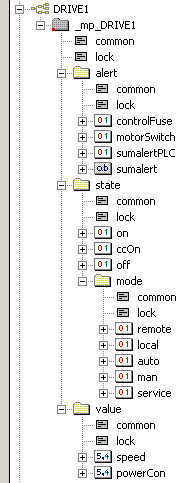dpTypeGet()
Returns the structure of a datapoint type.
Synopsis
int dpTypeGet(string name, dyn_dyn_string &elements, dyn_dyn_int
&types[, bool includeSubTypes = FALSE]);
Parameters
| Parameter | Meaning |
|---|---|
| dpt | Name of the datapoint type , for example: ExampleDP_Int |
| &elements | Type names |
| &types | Type numbers |
| includeSubTypes |
Default: FALSE - subtypes will note be passed TRUE - subtypes will be passed |
Return Value
If an error occurs -1, otherwise 0.
Errors
Missing arguments like undefined variables or missing parameters.
Description
The function returns the structure of a DP type.
![]() Example
Example
The example code returns the structure of a DP type DRIVE1. The datapoint type DRIVE1 is shown in the figure below and the structure is demonstrated in the table structure of the datapoint type DRIVE1.
Figure: Datapoint type DRIVE1

Structure of the datapoint type DRIVE1
| DRIVE1 | |||
| alert | |||
| controlFuse | |||
| motorSwitch | |||
| sumalertPLC | |||
| sumalert | |||
| state | |||
| on | |||
| ccOn | |||
| off | |||
| mode | |||
| remote | |||
| local | |||
| auto | |||
| man | |||
| service | |||
| value | |||
| speed | |||
| PowerCon |
main()
{
string dpt;
dyn_dyn_string names;
dyn_dyn_int types;
int struc;
dpt="ExampleDP_Int";
struc=dpTypeGet(dpt,names,types);
DebugN(dpt,names,types);
}Assignment
Datapoint functions
Availability
UI, CTRL
